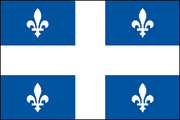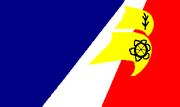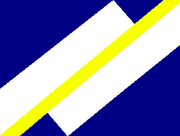French Canadian
|
|
French Canadian is a term that has several different connotations. In general, it refers to inhabitants of Canada who are francophone (French speaking) or whose ancestry is French Canadian and who identify with their French-Canadian heritage. With the exception of the Acadians who have a distinct shared history, most French Canadians find their ancestry among agriculturalists from France who colonized the area that is now Québec during Canada's colonial period starting in the 17th century.
Franco-Canadian is a similar term but does not imply longstanding ancestry on Canadian soil. It is sometimes used to designate recent immigrants from France or other French-speaking countries.
Francophone Canadians are found across Canada. Six million of Canada's French speakers are found in the province of Québec, where they constitute the majority language group, and another one million are distributed throughout the rest of Canada. Roughly 31 per cent of Canadian citizens are French-speaking and 25 per cent are of French-Canadian descent. Not all French speakers are of French descent, especially in modern-day Québec, and not all people of French-Canadian heritage are exclusively or primarily French-speaking.
Francophone cultures are an integral part of Canadian culture and Canadian literature.
| Contents |
French Canadian groups
A number of distinct groups of French Canadians may be identified. The largest is the Québécois, the majority of whom no longer self-identify as Canadiens-français (French Canadians). Others include:
- Franco-Albertans, province of Alberta
- Franco-Ontarians, province of Ontario
- Franco-Manitobans, province of Manitoba
- Fransaskois, province of Saskatchewan
- Franco-Columbians, province of British Columbia
There are smaller populations in every other province and territory, as well as in the United States (particularly in New England). The Acadians and Métis are not classified as French Canadians, but as distinct francophone peoples.
In popular English-Canadian and American usage, the terms for provincial subgroups, if used at all, are usually defined solely by province of residence, with all of the terms being strictly interchangeable with French Canadian. This is, in fact, offensive to many Canadians of French descent who identify strongly with the terms Québécois, Franco-Ontarian, etc., as cultural identities which are not casually interchangeable with each other.
For example, a woman from Québec who moved to Winnipeg, Manitoba would likely be referred to by many English Canadians as Franco-Manitoban or simply French Canadian. However, she would invariably consider herself a Québécoise living in Manitoba, and would likely reject both Franco-Manitoban and French Canadian as identities. Conversely, a Franco-Ontarian who moved to Montréal would not consider himself Québécois, but a Franco-Ontarian living in Montréal.
Consequently, French-Canadian individuals and communities should ordinarily be referred to by their appropriate provincial subgrouping (eg. Céline Dion should be referred to as Québécoise, Hearst, Ontario should be referred to as a Franco-Ontarian community, etc.) rather than as simply French Canadian. The term French Canadian should only be used when it is necessary to refer to all of the groups collectively, or where a specific province of origin cannot be determined or would not be accurate (e.g. in a historical context).
History
The French were the first Europeans to colonize Canada. (See French colonization of the Americas.) Their colonies of New France stretched across what today are the Maritime provinces, southern Québec and Ontario, as well as the entire Mississippi River Valley. The first permanent European settlement in Canada was at Port Royal in 1605. The territories of New France were Canada, Acadia, and Louisiana. The inhabitants of Canada called themselves the Canadiens, the inhabitants of Acadia, the Acadiens, and the inhabitants of Louisiana, the Louisianais. Many French Canadians are the descendants of the King's Daughters of this era.
After the 1760 British conquest of New France in the French and Indian War, the French-Canadian population remained important in the life of the colonies.
The British, who had gained Acadia by the Treaty of Utrecht (1713), deported 75% of the Acadian population to other British colonies at the beginning of the French and Indian War. The French Canadians escaped this fate in part because of the capitulation act that made them British subjects. It took the 1774 Quebec Act for them to regain the French civil law system, and in 1791 French Canadians in Lower Canada were introduced to the British parliamentary system when an elected Legislative Assembly was created.
The Legislative Assembly having no real power, the political situation degenerated into the Patriotes Rebellion of 1837-1838, after which Lower Canada and Upper Canada were unified. One of the motivations for the union was to limit French Canadian political power. After many decades of British immigration, the Canadiens became a minority in the Province of Canada in the 1850s.
French-Canadian contributions were essential in securing responsible government for the Canadas and in undertaking Canadian Confederation. However, over the course of the late 19th and 20th centuries, French Canadians' discontent grew with their place in Canada. (See Québec, History of Canada and Politics of Canada.)
During the latter part of the 19th and early 20th centuries, approximately 1 million French Canadians emigrated from the province of Quebec to settle in New England. The reason for this exodus was mostly economic, though also political.
Since 1968, French has been one of Canada's two official languages. It is the sole official language of Québec and one of the official languages of New Brunswick, the Northwest Territories, and Nunavut. The dialects of French spoken in Canada are quite distinct from those of France. See Canadian French.
French-Canadian flags
Missing image FlagofFranco-Albertains.png Franco-Albertains | Missing image Acadia_Flag.png Acadia | |
Missing image FlagofFranco-Manitobains.png Franco-Manitobains | Missing image Franco-Ontarian_flag.png Franco-Ontarian | |
Missing image FlagofFrancoTenois.png Franco Tenois | Missing image FlagofFransaskois.png Fransaskois |
Cross-References
See also Acadiande:Franko-kanadisch



